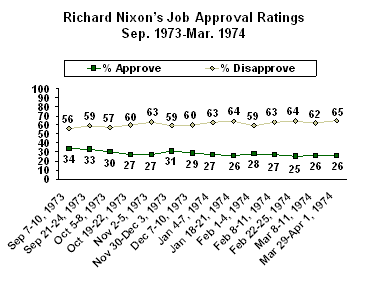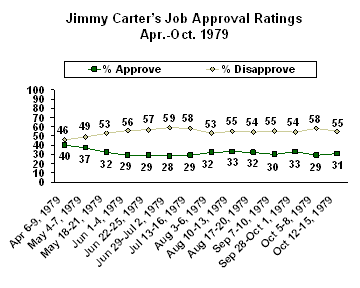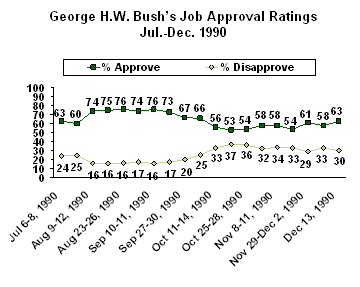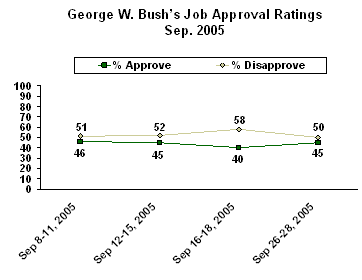GALLUP NEWS SERVICE
PRINCETON, NJ -- George W. Bush's job approval rating is already the lowest of his administration (36% in Gallup's latest poll), and is down 13 points from last July. Several events have conspired to drag down his rating, including Hurricane Katrina, the abandoned Harriet Miers Supreme Court nomination, the Dubai ports controversy, and the Iraq war. Now, the prospect of gas prices averaging more than $3 per gallon nationwide this summer could cause Bush's rating to sink even further.
In the past, presidents have not fared well when gas prices were high. In fact, some of the lowest presidential approval ratings Gallup has ever recorded were measured at times when the nation faced a gas crisis. High gas prices hit Americans in their pocketbooks, and the tendency has been for them to take out this frustration on government leaders.
Here is a rundown of presidential approval ratings during times when high gas prices were considered to be major crises for the United States. Bear in mind that high gas prices were often accompanied by, or perhaps a cause of, economic recession, high unemployment, and high inflation at these times:
- In October 1973, OPEC imposed an embargo on oil to the United States in response to U.S. support for Israel in the Yom Kippur War. Richard Nixon, already seeing his ratings drop because of the Watergate scandal, saw them slip from the mid-to-low 30s in September to below 30% in October and November, immediately after the embargo led to gas shortages in the United States.

- In the spring of 1979, the world oil supply took a hit because of the political unrest in Iran. Jimmy Carter's 40% April job approval rating fell to 32% by late May, and as gas prices stayed high over the summer, his approval rating sank to as low as 28% in late June and early July.

- The price of gas rose in late 1990 as the United States and its allies contemplated military action against Iraq for its invasion of Kuwait. After the Iraqi invasion in August, Americans rallied around George H.W. Bush and his approval rating rose from 60% to 74%. But as gas prices rose, Bush's support dropped, and in October 1990 his rating dipped to 53%, one of his lowest to that point.

- In September 2005, gas prices spiked to an average of more than $3 per gallon following the damage caused by Hurricane Katrina. The high prices were temporary, but likely took a toll on Bush's ratings, dropping him from the mid 40% range immediately following the storm to 40% in mid-September.

Whether or not gas prices were the major cause of these declines in approval ratings, the data make clear that presidential approval ratings have suffered when gas prices and availability were considered crises. This suggests that sustained high gas prices could be a significant threat to Bush's already low ratings. Even presidents with low ratings like Nixon and Carter saw their approval ratings sink further as gas prices rose.
Bush's rating for handling energy policy, 29% approval in the Apr. 7-9 Gallup poll, is already lower than his overall approval rating. When Gallup has asked about Bush approval on handling gas prices in particular, he has scored in similar territory. If gas prices become the dominant issue, Bush's overall approval rating could be pulled in the direction of his approval ratings on gas prices and energy.
What Is a President to Do?
The key question is what, if anything, can Bush do to counter higher gas prices and the likely drop in public support that goes with them?
In general, while the president receives much blame for high gas prices, previous polling shows that oil producers get even more blame. The president might gain some traction in taking a hard line with oil companies.
How much do you blame each of the following for the recent increase in gasoline prices -- a great deal, a moderate amount, not much, or not at all? How about -- [RANDOM ORDER]?
|
2005 Aug 28-30 |
Great |
Great deal/ |
Not much/ |
|
% |
% |
% |
|
|
Oil companies in the U.S. |
54 |
84 |
15 |
|
The Bush administration |
38 |
63 |
36 |
|
The Republicans in Congress |
27 |
57 |
40 |
|
The Democrats in Congress |
12 |
46 |
50 |
In the past, when gas prices have risen, Americans have attributed this to oil companies charging unfair prices rather than them charging a fair price given the market conditions. The margin in favor of the unfair price explanation is usually two-to-one or greater.
A recent Fox News poll shows that 48% of registered voters believe that oil producers (including domestic oil companies and OPEC) have the "most control over gas prices," while only 23% say the government, which includes 10% who say the president specifically.
Still, polls have shown that the public believes there are things a president can do to control oil prices, though the polls usually have not delved into exactly what those things are. In an April 2005 Gallup survey, 67% of Americans said there are reasonable steps Bush should take to lower gas prices in the United States. In August 2005, an ABC News/Washington Post poll found 60% of Americans saying there are things the "Bush administration can reasonably do to reduce gasoline prices," while 36% said the prices are high due to factors beyond the administration's control.
Bush announced Tuesday that he would ease environmental rules on gasoline production in hopes of making it easier for refiners to meet demand. He also suggested this week that he will investigate the possibility of price gouging by oil companies. This is a move the public would endorse -- 82% favored a congressional investigation into oil company profits last year.
Of course, Carter and Nixon took steps to try and combat the high oil prices. Presumably, regardless of what Bush does, he most likely could not halt or reverse a decline in support due to higher gas prices until Americans see relief at the gas pumps.